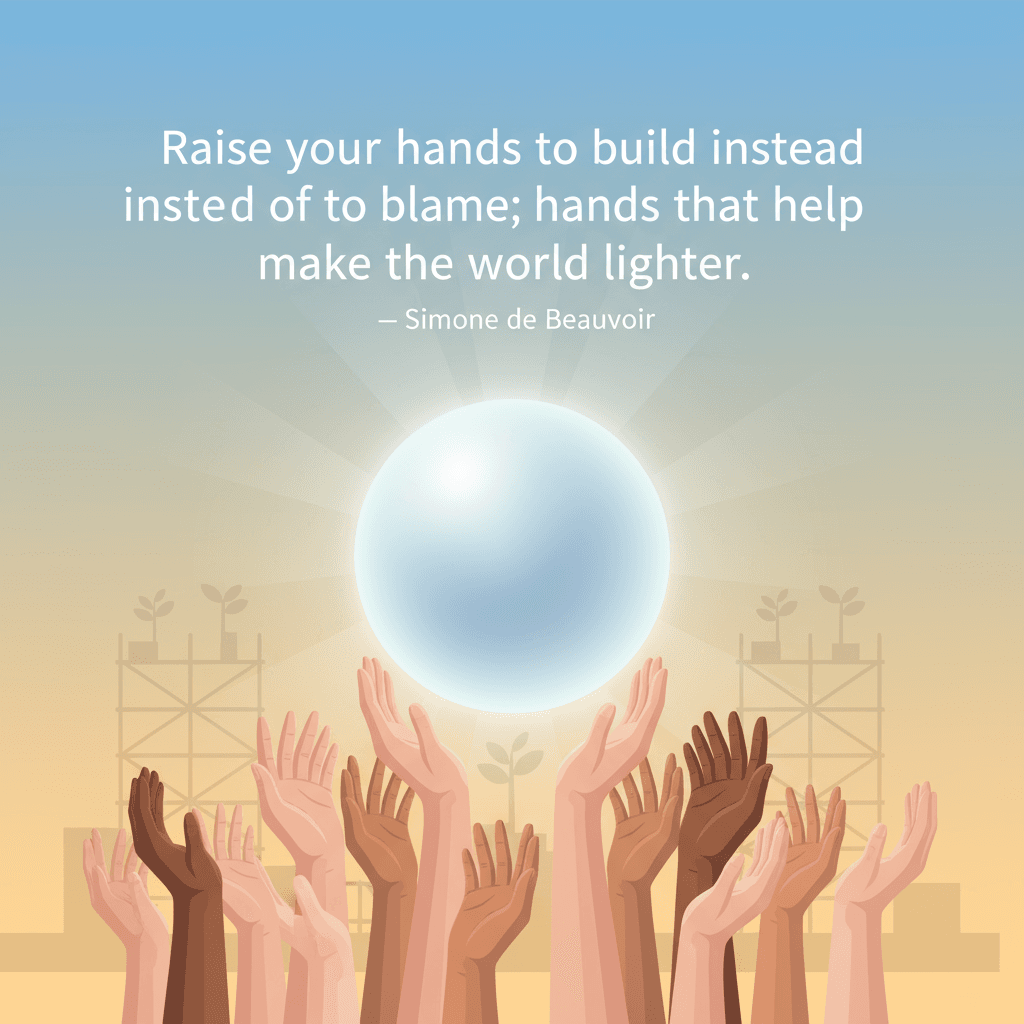Raising Hands to Build a Lighter World

Raise your hands to build instead of to blame; hands that help make the world lighter. — Simone de Beauvoir
From Accusation to Construction
At the outset, the line contrasts two gestures: the raised hand that points and blames, and the raised hand that lifts, makes, and mends. The former locks us in cycles of recrimination; the latter opens a space where burdens are shared and possibilities multiply. By reframing the instinct to fault into the resolve to build, the statement invites a practical ethics: do what reduces weight for others. In that shift, the world grows lighter not because problems vanish, but because more shoulders are under the load.
Beauvoir’s Ethics of Responsibility
Moving deeper, Simone de Beauvoir’s existentialism roots this call in responsibility and reciprocity. In The Ethics of Ambiguity (1947), she insists that freedom is interwoven: "To will oneself free is also to will others free." Blame isolates and immobilizes, while constructive action acknowledges our entanglement and agency. Thus, building is not naïve optimism; it is an adult response to ambiguity—working amid constraint to enlarge the field of shared freedom.
The Metaphor of Hands and Praxis
Furthermore, hands signify praxis: ideas becoming deeds. Beauvoir consistently links becoming to action—her famous line in The Second Sex (1949), "One is not born, but rather becomes, a woman," underscores how identities and worlds are shaped through projects. When hands craft, clean, code, vote, and care, abstractions take on weight and texture. In this sense, the injunction to help is a summons to concrete projects that translate values into structures people can actually live in.
Solidarity as an Antidote to Blame
Likewise, the passage nudges us from scapegoating to solidarity. Blame seeks culprits; building seeks collaborators. Hannah Arendt’s The Human Condition (1958) shows how action appears in plurality—new beginnings emerge when people act together, not against one another. Historical recoveries, from postwar reconstruction to community-led mutual aid, illustrate this logic: burdens lighten when many hands replace the single wagging finger. Solidarity does not erase conflict; it reorients it toward repair.
Accountability Through Repair
Even so, building does not mean ignoring harm. Instead of punitive spirals, it channels accountability into repair. Restorative justice frameworks—popularized by Howard Zehr’s Changing Lenses (1990)—move from "What law was broken?" to "Who was harmed and how do we make it right?" This shift preserves truth-telling while prioritizing restitution and reintegration. In Beauvoirian terms, it honors the freedom of all parties by reconstructing conditions where better choices become genuinely possible.
Everyday Ways to Lighten the Load
Ultimately, lightening the world begins locally and scales outward. Mentoring a newcomer at work, sharing credit, fixing a buggy line of code, delivering a meal, or organizing a neighborhood tool library—such acts change atmospheres, not just outcomes. As small projects cohere into institutions, they model a politics of making rather than blaming. Thus the hands we raise—whether to vote, to volunteer, or to steady someone climbing—become the quiet architecture of a more livable common world.